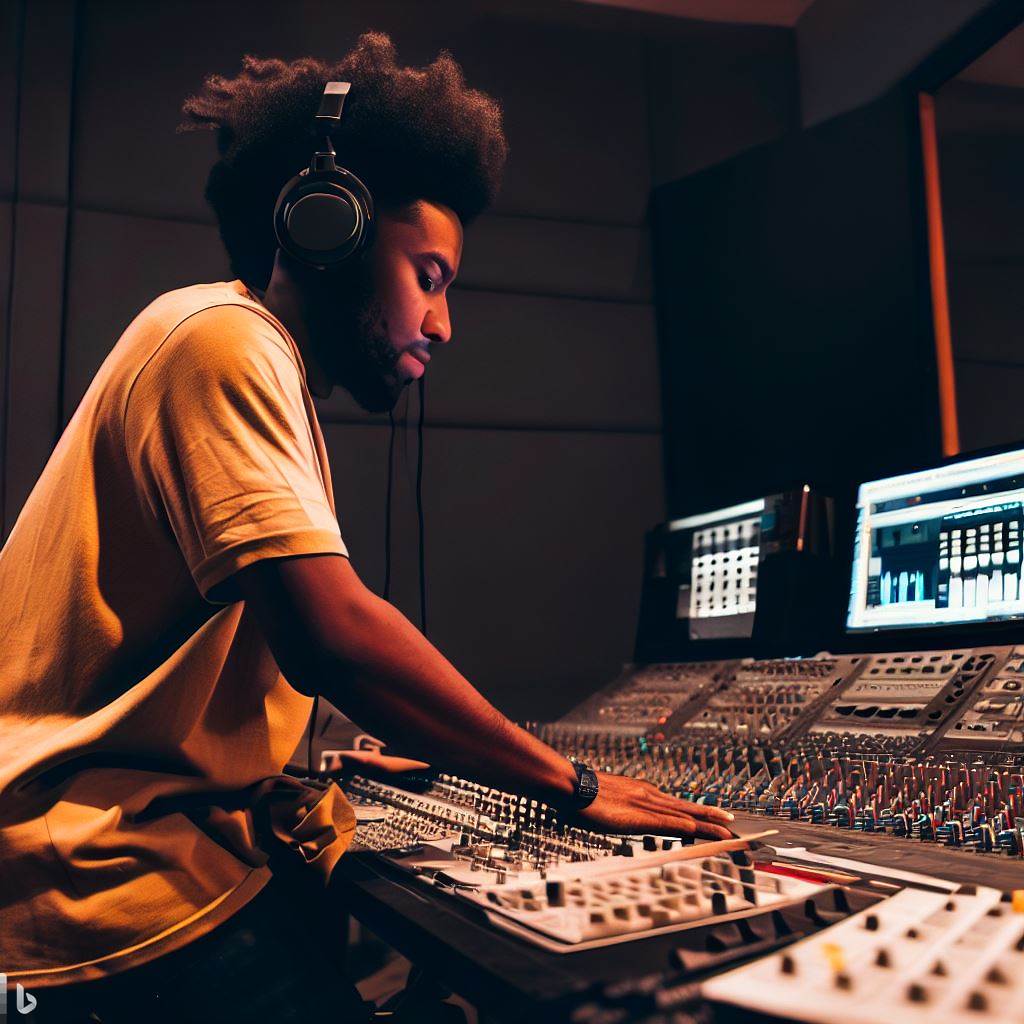Introduction
Nigeria’s music industry has experienced tremendous growth over the years, gaining recognition globally by knowing the Importance of Mixing Engineers in Nigerian Music.
With artists like Burna Boy and Davido gaining popularity and collaborating with international acts, Nigerian music is on the rise.
The role of mixing engineers in Nigerian music is becoming increasingly crucial. As the Nigerian music industry expands, the need for skilled and talented mixing engineers becomes paramount.
Nigeria’s music scene, a powerhouse of Afrobeats, hip-hop, and diverse cultural melodies, garners international attention.
Popularity Surge:
Nigerian artists and genres gain global recognition, with hits crossing borders and topping charts.
Thesis Statement: Amid this musical ascent, the significance of mixing engineers in Nigerian music skyrockets.
Key Factors
- Sound Aesthetics: Engineers refine tracks, ensuring each element harmonizes, capturing listeners’ hearts and ears.
- Quality Enhancement: Skillful mixing elevates production, making songs competitive in the global music arena.
- Cultural Fusion: Engineers blend traditional rhythms with modern sounds, preserving heritage while embracing innovation.
- Artistic Support: Collaborating with artists, engineers manifest their creative vision through pristine soundscapes.
- Market Demand: Rising music industry demands polish and professionalism, making engineers indispensable.
- Global Exposure: High-quality mixing positions Nigerian music on international playlists, amplifying its influence.
- Technology Integration: Engineers adopt cutting-edge tools for precision, staying relevant in a rapidly evolving field.
- Unique Identities: Engineers shape each artist’s signature sound, contributing to Nigeria’s diverse musical landscape.
Conclusion: In this era of global music exchange, mixing engineers serve as architects of sonic brilliance, fueling Nigeria’s musical voyage.
A Mixing Engineer
Role and Responsibilities of a Mixing Engineer
- A mixing engineer is a professional responsible for combining and balancing the different audio elements of a music track.
- They carefully listen to individual tracks and adjust the levels, panning, and equalization to create a cohesive sound.
- Another essential responsibility is to enhance the overall sonic quality of the track by using various audio processing techniques.
- They work closely with artists, producers, and recording engineers to understand their vision and bring it to life through mixing.
- Mixing engineers play a crucial role in ensuring that the artistic intent of the song is effectively portrayed.
- They have a deep understanding of music theory, sound engineering principles, and technical equipment necessary for effective mixing.
- Additionally, they possess a strong ear for detail and can identify and eliminate any sonic flaws or inconsistencies.
- Collaboration and communication skills are key for mixing engineers as they often work in a team environment.
- They must be able to receive feedback and make necessary adjustments while maintaining the original artistic integrity.
Importance of Technical Expertise and Creativity
- Mixing engineers possess technical expertise in using digital audio workstations (DAWs), plugins, and hardware.
- Their technical skills allow them to manipulate audio elements effectively and achieve a polished and professional sound.
- They understand how different audio processors, such as compressors or reverbs, can be used to enhance specific elements of a track.
- Moreover, their creativity plays a crucial role in crafting unique and engaging mixes that capture listeners’ attention.
- A mixing engineer’s creative decisions regarding the placement, effects, and overall sonic landscape contribute to the artistic expression.
- Through their creative choices, they can highlight specific instruments, create depth, and evoke emotions in the listener.
- Their ability to think outside the box enables them to experiment with unconventional techniques and bring innovation to music.
Impact of a well-mixed Track on Music Quality
- A well-mixed track significantly enhances the overall quality and impact of the music.
- By skillfully balancing the audio elements, a mixing engineer ensures that each instrument is heard clearly and harmoniously.
- This clarity allows the listener to fully experience the musical arrangement and appreciate the individual nuances.
- A well-mixed track has a balanced frequency distribution, eliminating any harsh or muddy tones that might distract from the music.
- It creates a pleasant and immersive listening experience that keeps the audience engaged throughout the song.
- Furthermore, a well-mixed track stands out from the competition and increases the chances of success in the industry.
- Radio stations, streaming platforms, and music producers are more likely to promote and support tracks with high-quality mixes.
- Ultimately, a mixing engineer’s contribution ensures that the music reaches its full potential and resonates with the audience.
A mixing engineer is a vital figure in Nigerian music production.
Their role encompasses balancing audio elements, utilizing technical expertise and creativity, and ultimately elevating the overall quality of the music through well-crafted mixes.
By understanding the responsibilities and impact of mixing engineers, we gain a deeper appreciation for the significance of their role in the Nigerian music industry.
Read: Emerging Trends in Sound Editing in Nigeria
Evolution of Nigerian Music
Historical Overview of Nigerian Music
- Nigerian music has a rich history dating back to ancient times.
- Traditional Nigerian music varied across different ethnic groups and regions.
- Each group had its unique instruments, melodies, and rhythms.
- The introduction of western music during colonial times influenced the Nigerian music scene.
- Highlife music, a fusion of traditional and western elements, gained popularity in the 1950s.
- Highlife’s upbeat tempo and catchy melodies appealed to Nigerians across different backgrounds.
- By the 1960s, Nigerian music was becoming more diverse, incorporating various genres like Afrobeat and Juju.
- Artists like Fela Kuti and King Sunny Ade rose to popularity, representing Nigeria’s unique musical identity.
Merging of Traditional Nigerian Sounds with Contemporary Styles
- As Nigeria embraced globalization, Nigerian music began to incorporate contemporary styles.
- Artists started blending traditional Nigerian sounds with genres like hip-hop, R&B, and dancehall.
- The infusion of Afrobeat into mainstream music helped Nigerian artists gain international recognition.
- Nigerian musicians began collaborating with foreign artists, resulting in cross-cultural fusions.
- This merging of traditional and contemporary styles created a distinct sound unique to Nigerian music.
- Nigerian music videos also became more visually appealing, incorporating elements of indigenous culture.
- The fusion of traditional Nigerian sounds with modern genres expanded the global appeal of Nigerian music.
Evolution’s Impact on Mixing Requirements
- The evolution of Nigerian music has led to an increased complexity of mixing requirements.
- The fusion of diverse genres and unique sounds requires skilled mixing engineers.
- Mixing engineers play a crucial role in balancing the different elements and enhancing the overall sound.
- They ensure that traditional Nigerian instruments blend seamlessly with electronic and digital elements.
- The complexity of the music necessitates advanced mixing techniques to achieve the desired sonic quality.
- Mixing engineers need to have a deep understanding of both traditional and contemporary sound production.
- They use a variety of tools, software, and effects to achieve the desired sonic characteristics.
- The demand for talented mixing engineers has grown exponentially as Nigerian music continues to evolve.
- Without skilled mixing engineers, the complexity of Nigerian music would not reach its full potential.
Nigerian music has evolved tremendously over the years, blending traditional sounds with contemporary styles.
This fusion has not only created a unique musical identity but also increased the complexity of mixing requirements.
Skilled mixing engineers are crucial in ensuring that the diverse elements of Nigerian music blend seamlessly and achieve the desired sonic quality.
As Nigeria’s music scene continues to grow, the importance of mixing engineers will only rise further.
Read: Top Nigerian Mixing Engineers and Their Iconic Works
The Importance of Sound Quality
The connection between sound quality and audience satisfaction
- High sound quality enhances the overall listening experience for audiences.
- Listeners appreciate clear vocals, balanced instrumentation, and immersive soundscapes.
- Poor sound quality can diminish the impact of a song, leading to dissatisfaction among listeners.
- Top-notch sound quality has the power to captivate and emotionally connect with the audience.
- Listeners tend to engage more with songs that offer superior sound quality.
The rise of music streaming platforms and the need for high-quality audio
- Streaming has become the dominant method of music consumption in Nigeria and worldwide.
- Platforms like Spotify, Apple Music, and Deezer prioritize high-quality audio for users.
- Listeners expect their streaming experience to deliver pristine sound.
- Music streaming platforms reward artists with better sound quality through higher royalties.
- The demand for high-quality audio has increased the significance of mixing engineers.
The role of mixing engineers in ensuring superior sound quality
- Mixing engineers play a crucial role in shaping the final sound of a song or album.
- They meticulously balance various elements like vocals, instruments, and effects.
- A skilled mixing engineer can make recordings sound professional and polished.
- They possess the technical expertise to use advanced audio processing tools effectively.
- Mixing engineers optimize sound quality for different distribution channels, including streaming platforms.
Superior sound quality is a non-negotiable aspect of modern music production. It directly affects audience satisfaction and the success of artists in the digital landscape.
With the rise of music streaming platforms, the need for high-quality audio has become even more critical.
Listeners expect nothing short of exceptional sonic experiences when streaming their favorite songs, and platforms oblige by delivering high-resolution audio options.
High-quality sound makes the nuances of vocals more crisp, the kick drums more punchy, and the guitar solos more lively.
When sound quality is compromised, these sonic elements lose their impact, resulting in a weaker connection between the artist and the audience.
Music streaming platforms have disrupted the traditional music industry model
They offer convenience, accessibility, and a vast library of songs at listeners’ fingertips.
Artists and record labels must deliver music that meets the streaming standards, ensuring that their songs are well-produced and polished.
They skillfully balance the various components of a song, including vocals, instruments, and special effects. By fine-tuning each element, they create a cohesive sonic landscape that immerses the listener.
They apply equalization, compression, and other techniques to ensure clarity, warmth, and punch.
Their understanding of psychoacoustics enables them to manipulate frequencies and create a well-balanced mix that pleases the ear.
Furthermore, mixing engineers adapt their techniques to suit different distribution channels.
Mixing engineers have the critical role of crafting and fine-tuning songs, ensuring that they possess the necessary sonic allure to captivate audiences.
Their technical skills and attention to detail guarantee that Nigerian music reaches global standards of sound quality in the evolving digital landscape.
Read: Understanding the Role of Managers in Nigerian Art Scene

Enhancing Competition and Marketability
The Nigerian music industry is a highly competitive landscape where aspiring artists strive to make their mark.
With a population of over 200 million people, Nigeria offers a vast market potential for musicians. However, with such a saturated industry, it becomes crucial for artists to stand out from the crowd.
A well-mixed track can serve as a differentiating factor in the Nigerian music market. Professional mixing engineers play a pivotal role in achieving the desired sound quality that captivates listeners.
One success story that highlights the importance of professional mixing engineers is the rise of Burna Boy. Before his breakthrough, Burna Boy faced challenges in getting his music recognized.
Another artist who benefited from professional mixing engineers is Davido. With the help of skilled engineers, Davido’s music gained remarkable sonic quality and clarity, setting him apart from his peers.
This, coupled with his talent, propelled him to become one of Africa’s most successful artists.
The case of Wizkid also demonstrates how professional mixing engineering can elevate an artist’s career.
Through collaborations with mixing engineers who understood his artistic vision, Wizkid’s music evolved into a unique fusion of Afrobeats and international influences.
The result was a distinct sound that resonated with audiences worldwide, elevating him to global stardom.
Furthermore, in a global music market, Nigerian artists need to compete not only with local acts but also with international artists.
The success stories of artists like Burna Boy, Davido, and Wizkid serve as examples of how professional mixing engineers contribute to the rise of Nigerian talents on the global stage.
Read: Exploring Artists’ Agent Career: A Nigerian Perspective
Collaborations with International Artists and Producers
The growing collaborations between Nigerian artists and international musicians
In recent years, Nigerian music has gained global recognition, leading to an increase in collaborations with international artists.
Popular Nigerian musicians like Burna Boy, Wizkid, and Davido have collaborated with artists such as Drake, Beyoncé, and Snoop Dogg.
These collaborations have not only exposed Nigerian music to a wider audience but also opened doors for future partnerships.
International artists are recognizing the unique sounds and talents that Nigeria brings to the music industry.
The growing collaborations demonstrate the willingness of artists to mix different cultural influences to create groundbreaking music.
The role of mixing engineers in bridging cultural and technical gaps
Mixing engineers play a crucial role in ensuring that collaborations between Nigerian and international artists are successful.
They are responsible for blending the different styles, genres, and techniques used by artists from different cultural backgrounds.
By understanding the nuances of both Nigerian and international music, mixing engineers can bridge the cultural gaps and create a cohesive sound.
Mixing engineers act as mediators, ensuring that both the Nigerian artists and their international counterparts are satisfied with the final product.
They help translate the creative visions of both parties into a unified piece of music that showcases the best of both worlds.
How working with international experts elevates the quality of Nigerian music
Collaborating with international experts introduces Nigerian artists to new production techniques and industry standards.
International engineers and producers bring a wealth of experience and knowledge that can enhance the overall quality of the music.
They often have access to state-of-the-art equipment and studios, which can result in a more polished and professional sound.
Working with international experts also provides Nigerian artists with valuable networking opportunities and exposure to a wider audience.
Through these collaborations, Nigerian artists can learn and grow, pushing the boundaries of their creativity and expanding their musical horizons.
The rising importance of mixing engineers in Nigerian music is evident in the growing collaborations between Nigerian artists and international musicians.
These collaborations not only bridge cultural and technical gaps but also elevate the quality of Nigerian music by exposing artists to new production techniques and industry standards.
As Nigerian music continues to gain global recognition, the role of mixing engineers will only become more crucial in bringing together diverse musical influences and creating groundbreaking music that transcends borders.
The Future of Mixing Engineers in Nigerian Music
The potential for growth and demand for mixing engineers
- The Nigerian music industry is experiencing exponential growth, creating a higher demand for mixing engineers.
- This growth is fueled by the increasing popularity and global recognition of Nigerian music.
- With more artists emerging and releasing new music, the need for professional mixing engineers continues to rise.
- Mixing engineers play a crucial role in making music sound polished and commercially viable.
- As the industry expands, the demand for skilled mixing engineers will only continue to grow.
The need for formal education and training opportunities
- Formal education and training opportunities are essential for aspiring mixing engineers in Nigeria.
- While some professionals are self-taught, a formal education provides a solid foundation and technical knowledge.
- Specialized courses and programs in audio engineering and music production are now available in Nigeria.
- These educational opportunities provide aspiring mixing engineers with the necessary skills and industry insights.
- Formal training also allows individuals to network with industry professionals and gain hands-on experience.
The increasing recognition and appreciation for this profession
- Mixing engineers are now getting the recognition they deserve in the Nigerian music industry.
- Artists and producers are realizing the significant impact that a skilled mixing engineer can have on their music.
- With the increasing competition, artists are prioritizing high-quality sound and seeking professionals to achieve it.
- Mixing engineers are being acknowledged for their ability to enhance and elevate the overall music production.
- As the industry evolves, there will be more opportunities and accolades for talented mixing engineers.
The future for mixing engineers in Nigerian music is promising. The industry’s rapid growth and increasing demand for high-quality music necessitate the services of skilled professionals.
Formal education and training programs now exist, providing aspiring engineers with the necessary tools and knowledge to thrive in this field.
Furthermore, the recognition and appreciation for mixing engineers are on the rise, as artists and producers understand the impact they can have on their music.
As the Nigerian music industry continues to expand, the future shines bright for mixing engineers, presenting numerous growth opportunities and a thriving profession.
Uncover the Details: How to Navigate the Nigerian Performance Art Scene
Conclusion
The importance of mixing engineers in Nigerian music cannot be overstated. Aspiring mixing engineers should pursue their passion and contribute to the industry.
The flourishing Nigerian music industry greatly relies on the instrumental role of mixing engineers.
Recap:
Mixing engineers shape sonic landscapes, ensuring balanced vocals, instruments, and impactful beats for memorable tracks.
Encourage:
Aspiring engineers, dive into this dynamic field, mastering software, and acoustics, and honing your creative flair.
Flourishing Industry:
The Nigerian music scene thrives globally, with diverse genres captivating audiences. Mixing engineers amplify its allure.
Instrumental Role: Mixing engineers, architects of auditory magic, sculpt chart-toppers, and contribute profoundly to Nigeria’s musical eminence.




